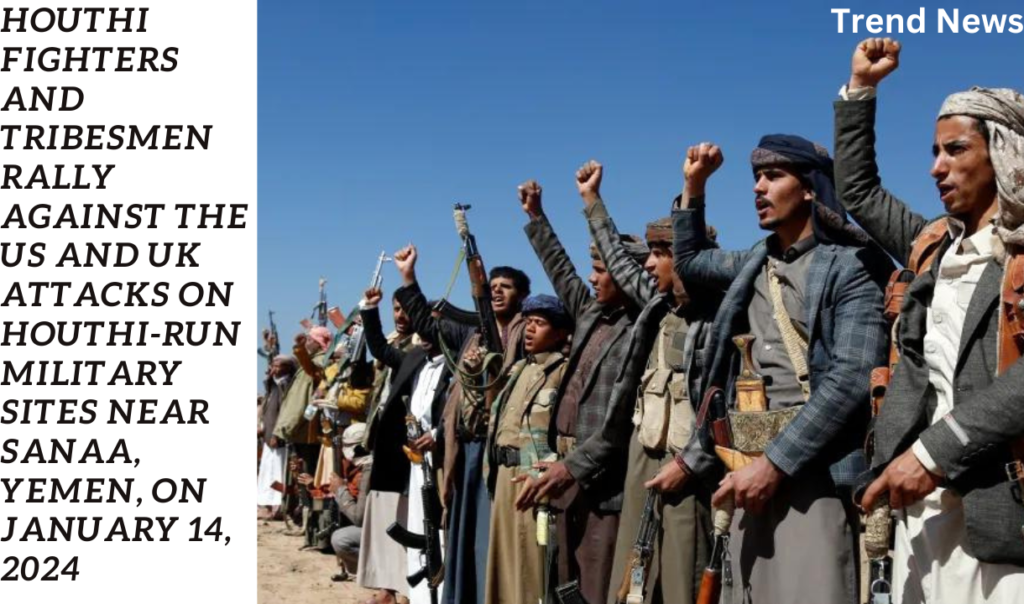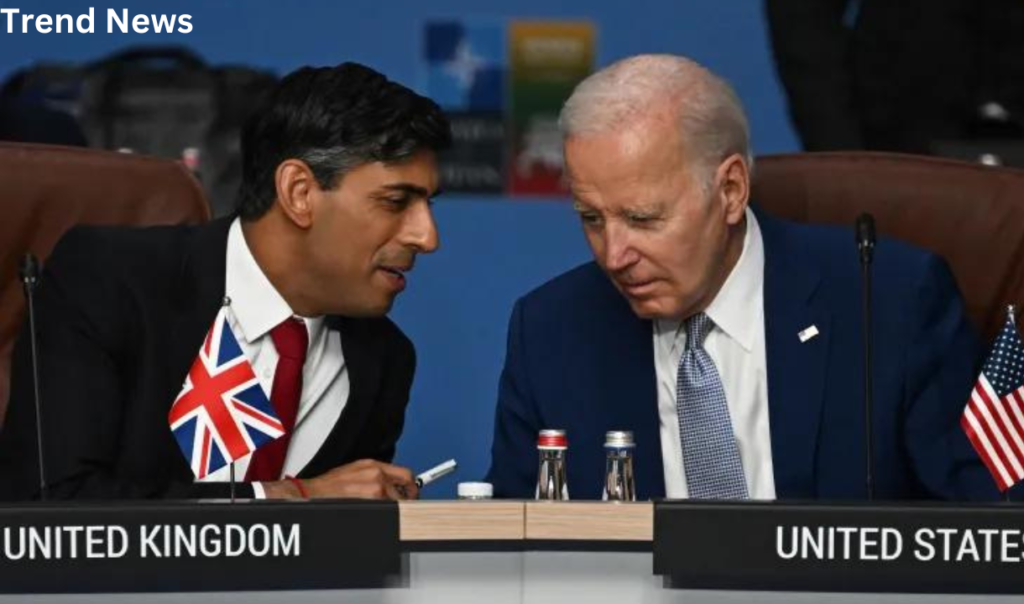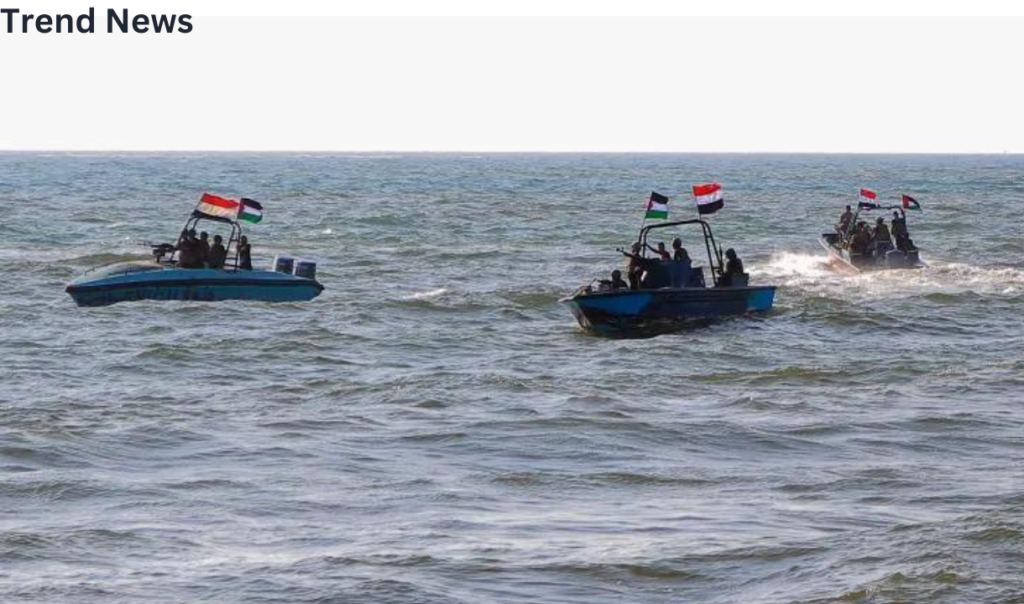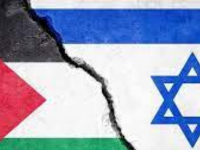
BEIRUT, LEBANON Yemen’s Houthis targeted a U.S.-owned ship on Monday, a day after it attacked a U.S. Navy destroyer in the Red Sea, indicating that the group is responding to recent U.S. and U.K. airstrikes in Yemen. Will not stop.
The Houthis have not only experienced a surge in domestic popularity but have also garnered support from the so-called axis of resistance, composed of Iran-backed groups in the region. This solidarity was further fueled by their discontent with Israel’s military campaign in Gaza, resulting in the loss of over 24,000 lives, predominantly civilians.
And as the war on Gaza continues, so too is the possibility of a confluence of conflict, experts told Trend News.
“Yemen is now becoming a participant in regional tensions related to the Gaza war,” said Reman Al-Hamdani, a researcher at Dubai-based social organization ARC Group.
A cycle of increasing stress.
The Houthis control western Yemen, including the strategically valuable Bab al-Mandab strait, which leads to the Red Sea and the Suez Canal.
They say they are blocking Israeli and Israeli-owned ships passing through Bab al-Mandab to pressure Israel into a cease-fire in Gaza or at least allow adequate humanitarian aid.
But they now appear to have expanded their operations after hitting a US warship in the Gulf of Aden, at least their second attack on a ship in a body of water off Yemen’s southern coast.
To date, there have been no casualties as a result of the Houthi intervention in the Red Sea. However, the situation could change if American or British troops were directly attacked.
“In the event of such an incident, the response in Yemen could take a significantly more aggressive stance,” Al Hamdani noted.
Such developments could further escalate tensions in the region.
Amid the protracted conflict, Iranian-backed militias in Iraq and Syria have targeted US bases, prompting the US to retaliate with the killing of Mushtaq Talib al-Saadi, also known as Abu Taqwa. Gaya, who was an Iranian leader of Harakat al-Najaba. Supported militias in Baghdad
To take steps for .
Along with this, Lebanon’s Hezbollah is engaged in exchanging drone and rocket attacks with Israel. “We find ourselves caught in an escalating cycle,” remarked Yemen researcher Nicholas Brumfield. “The potential for broader regional tensions is hard to ignore.” Despite repeated assurances from the administration of US President Joe Biden about its efforts to prevent escalation of regional tensions, critics say such statements lack credibility, especially from the administration’s stance on Israel. Consider the decision to bypass the US Congress twice for arms supplies. To encourage aid or a cease-fire.
Hannah Porter, a researcher at MIN, told Trend News, “If the US and UK respond to increased Houthi operations in Yemen with more airstrikes, it will affect regional security, including in Saudi Arabia and the United Arab Emirates. .

In response to Houthi attacks on the Red Sea, UK Prime Minister Rashid Sink and US President Joe Biden have ordered their respective forces to launch airstrikes on Houthi-held positions in Yemen.
While these nations are currently reluctant to re-engage in a military conflict with the Houthis, emerging tensions could change that strategic calculus.
Saudi Arabia is actively seeking a ceasefire with the Houthis to end Yemen’s decades-long civil war. Riyadh is determined to prevent a revival of past Houthi attacks that affected its oil production. However, the recent spate of attacks in the Red Sea is likely to derail the ongoing peace process .
The Houthis are playing with fire, and one wrong move could have serious consequences,” Al-Hamdani said. “However, it seems that both the Houthis and the Saudis, as well as the US and the UK, want an end to the state of war that has I they find themselves.
Steady intensification of Red Sea attacks.
Although the Houthis have so far caused no casualties, their actions have disrupted global shipping through the Red Sea, prompting the US and UK to decide to attack Yemen.
“The US and the UK felt like they were backed into a corner and really had no other options,” Porter said.
The Houthis tested 21 drones and missiles in the Red Sea on Wednesday, which were repulsed by US and UK navies. The following day, American and British forces carried out airstrikes on several locations in Yemen.
Although the United States has claimed that these strikes have significantly reduced the Houthis’ ability to target ships, the group remains undaunted. In fact, Yemeni analysts believe that attacks may increase rather than decrease.
The Houthis have no intention of stopping their attacks in the Red Sea,” Porter asserted.
“We will likely see further escalation by the Houthis, characterized by a frequent pattern of attacks and close encounters involving military and civilian aircraft.”
The retaliation by the United States and Britain appears to have strengthened the Houthis’ resolve, evidenced by a massive rally in the capital Sanaa, where hundreds of thousands of people gathered on Friday.
“This represents the ‘big bad’ that the Houthis have been preparing to fight for two decades,” notes Brumfield. “While ‘Death to Israel’ is on [the Houthis’] flag, ‘Death to America’ takes precedence.”
The only casualties in these encounters are of the Houthi forces. On December 31, when four Houthi ships attempted to seize a ship navigating the Red Sea, US helicopters targeted them, killing 10 fighters and sinking three boats.

Thriving in war, struggling in peace.
The Houthis have consistently been an opposition force within Yemen, primarily engaged in confrontations against the country’s government. His prominence rose when he ousted Yemen’s internationally recognized president, Abd Rabbuh Hadi, in 2014, triggering his involvement in Yemen’s civil war.
Hadi was backed by Saudi Arabia, which for a time led an Arab coalition to counter the Houthi rebels.
Since April 2022, a ceasefire has been observed as a result of negotiations between the Houthis and Riyadh, with the aim of establishing a more durable ceasefire.
Currently, Yemeni analysts are divided on whether the Houthis truly want a complete end to the ceasefire and whether they would block the Red Sea route in the event of a cease-fire in Gaza. Some believe the Houthis may continue their operations, while others believe the group has adhered to the last cease-fire between Israel and Hamas in late November.
are not particularly strong.
While this approach may suit the Houthis’ domestic and regional goals, the Yemeni population is likely to suffer the consequences. Unfortunately, for those in control of what is considered ‘the world’s greatest humanitarian disaster’, according to Al Hamdani, the potential outcome could be catastrophic.
-
China calls for specific road map for implementation of two-state solution
-
Cold Were What Red Sea Interceptions Potentially Trigger a Regional Conflict ?
-
Iceland volcano – emergency declared as lava sets town on fire
-
Facebook and Instagrame currently Down ?
-
Carl Weathers, actor best known for roles in Rocky, Predator and The Mandalorian, dies aged 76: ‘An extraordinary human being’
-
A mother in Pennsylvania has been charged with allegedly faking a child’s suffocation and cradle-related death.




[…] Read also: Cold Were What Red Sea Interceptions Potentially Trigger a Regional Conflict ? […]
[…] Cold Were What Red Sea Interceptions Potentially Trigger a Regional Conflict ? […]